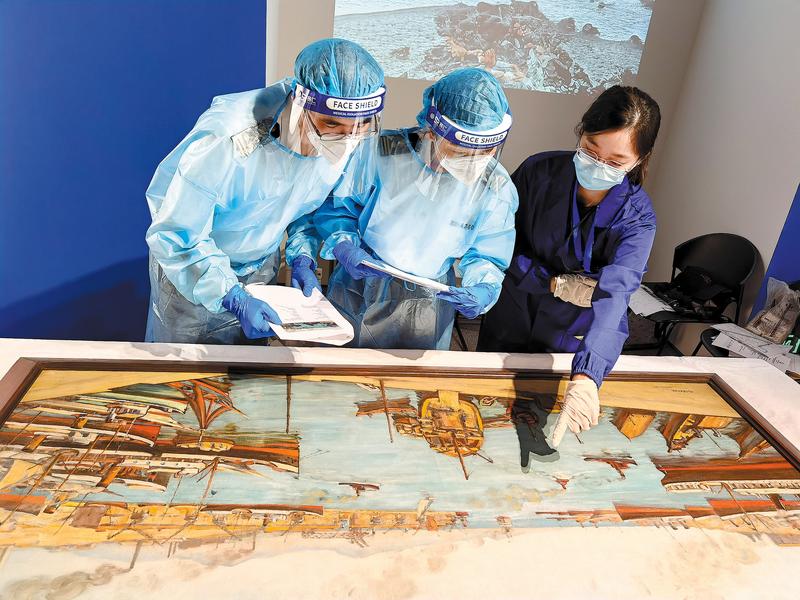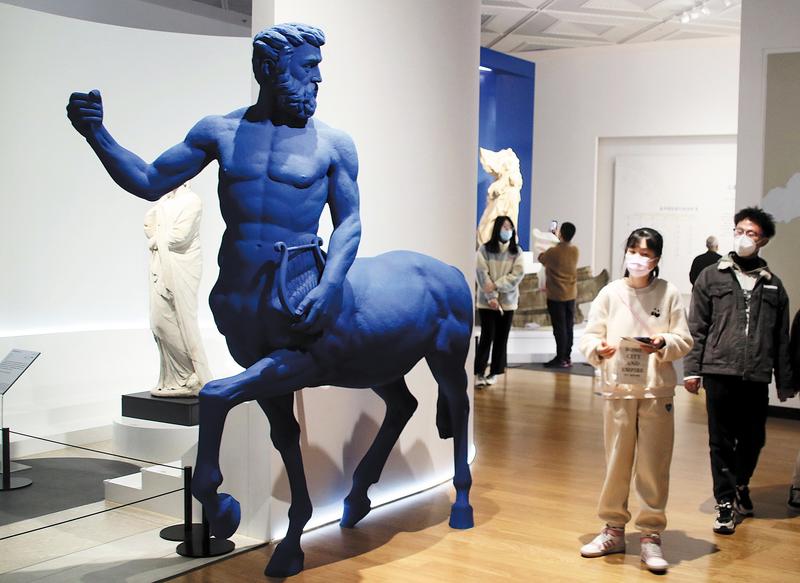Greek academics honored to receive reply letter from Xi
 An oil painting depicting a scene from the Greek port of Piraeus in 1934 is examined on a table on July 12, 2022, at the Shanghai Museum. The Thalassa: The Sea in Greek Art from Antiquity until Today exhibition displayed 45 cultural items provided by the Greek government. (HE YI / FOR CHINA DAILY)
An oil painting depicting a scene from the Greek port of Piraeus in 1934 is examined on a table on July 12, 2022, at the Shanghai Museum. The Thalassa: The Sea in Greek Art from Antiquity until Today exhibition displayed 45 cultural items provided by the Greek government. (HE YI / FOR CHINA DAILY)
In the spring of 2020, eight universities at the two ends of the Eurasian region, in Greece and China, launched a common mission to establish the Center of Chinese and Greek Ancient Civilizations.
Last week, the center was officially inaugurated in Athens after three years of efforts, despite the difficulties resulting from the COVID-19 pandemic.
For Stelios Virvidakis, a professor at the University of Athens, it was a particular honor to receive congratulations from President Xi Jinping after he and four other Greek scholars introduced the preparatory work to Xi in a recent letter.
"We know that President Xi must be very busy and we couldn't be sure that he would find the time to send us a reply. It showed that he recognized the importance of the values we wanted to promote," he told China Daily.
In his reply, Xi underlined the importance of deeply understanding the age-old origins and rich content of different civilizations and allowing the essence of all civilizations to benefit the present generation and all mankind.
"We share the (Chinese) president's conviction that the legacy of both civilizations can once more provide spiritual guidance helping us deal with the serious problems humanity is facing," Virvidakis said.
Pantelis Golitsis, an assistant professor at Aristotle University of Thessaloniki and one of the authors of the letter to Xi, said he was grateful to the president for his generous support for the scientific activities of the center.
"I completely share his vision about the importance of mutual learning among civilizations, which drives human prosperity and global peace," he said, adding that Greece and China have a lot to learn from each other.
The center was the outcome of the consensus reached by Chinese and Greek leaders during Xi's state visit to the European country in 2019.
After visiting the Acropolis Museum accompanied by then Greek president Prokopis Pavlopoulos, Xi said the tour left him with a beautiful and memorable impression, and deepened his understanding of ancient Greek civilization. He said he felt the impact of history and further realized that China and Greece, as two ancient civilizations, have much in common.
After the visit, the two sides started to build a center dedicated to what the two leaders proposed.
 Visitors view ancient Greek artifacts at an exhibition at Suzhou Museum in Jiangsu province on Jan 10. The Ancient Greeks: athletes, warriors and heroes exhibition displayed 177 ancient Greek artifacts from the British Museum's collection. (WANG JIANKANG / FOR CHINA DAILY)
Visitors view ancient Greek artifacts at an exhibition at Suzhou Museum in Jiangsu province on Jan 10. The Ancient Greeks: athletes, warriors and heroes exhibition displayed 177 ancient Greek artifacts from the British Museum's collection. (WANG JIANKANG / FOR CHINA DAILY)
George Papandreou, who served as Greek prime minister from 2009 to 2011, has met Xi many times. He told reporters in a recent interview that in his eyes, Xi is a leader who has a good understanding of the essence and mission of civilization.
"In both the Chinese civilization and Greek civilization, we have concepts which provide us with guidelines to more harmonious cooperation in our world," he said, noting that, through their exchanges, the two countries could set an example of equal dialogue between civilizations.
According to Virvidakis, the Center of Chinese and Greek Ancient Civilizations will implement a series of projects this year, including academic exchanges, joint workshops and education programs, and summer and winter schools for students, as well as a major conference on issues related to the study of the two philosophical traditions.
"Thus, exchanges between academics, researchers and scholars in the two countries will soon multiply and they may also be joined by writers and artists," he said.
In a speech delivered in 2014 at the headquarters of the United Nations Educational, Scientific and Cultural Organization, Xi for the first time elaborated on his view that civilizations will become richer and more colorful with exchanges and mutual learning, thus providing an important drive for human progress and global peace and development.
He later stressed on different occasions that closer people-to-people exchanges and mutual learning of civilizations are a sure way to eliminate estrangement and misunderstanding and promote mutual understanding among nations.
Over the years, various types of exchange activities between Chinese and foreign civilizations have taken place in different places across the world.
In the Belgian city of Ghent, musical pieces by Belgian composer Johan Famaey were performed and sung in Chinese by Belgian artists to celebrate the Chinese New Year in February.
In Siem Reap province of Cambodia, Chinese and Cambodian experts are working together to restore the Royal Palace of the Angkor Thom after successfully restoring the Chau Say Tevoda temple and the Ta Keo temple at Angkor Wat.
In Saudi Arabia, an ancient and prosperous seaport, known as al Serrian, was unveiled in 2018 thanks to a joint Chinese-Saudi archaeological team's discovery of more than 100 ancient tombs and dozens of cultural relics.
In Iran, a total of 100 scholarships will be provided by the Chinese government to Chinese-language teachers there over the next five years as agreed upon by the two sides during Iranian President Ebrahim Raisi's recent visit to China.
"Mutual learning and exchanges among different civilizations can help dispel misgivings and enhance mutual trust, thus laying a solid cornerstone for the stable development of state-to-state relations," said Qian Yingchao, a professor of Greek studies at Beijing Foreign Studies University.
Virvidakis, from the University of Athens, said that exchanges of intellectuals, academics and scholars could also provide a basis for developing friendship among people who speak different languages and have their own particular historical experiences and cultural legacies.
He noted that what is most important is the possibility of highlighting shared and similar values that reveal the common core of humanity.
Wang Yong, the Chinese secretary-general of the newly established center and an associate professor at Southwest University in Chongqing, said that the best approach to furthering the mutual understanding between China and the rest of the world is to promote exchanges among different civilizations.


